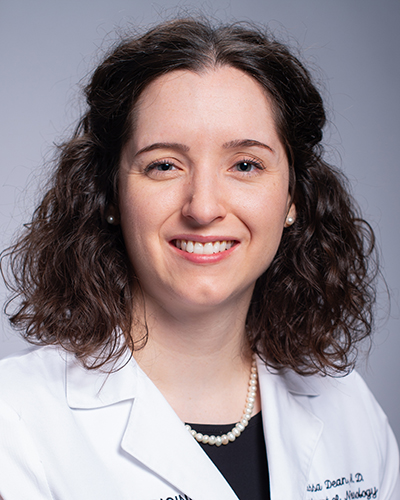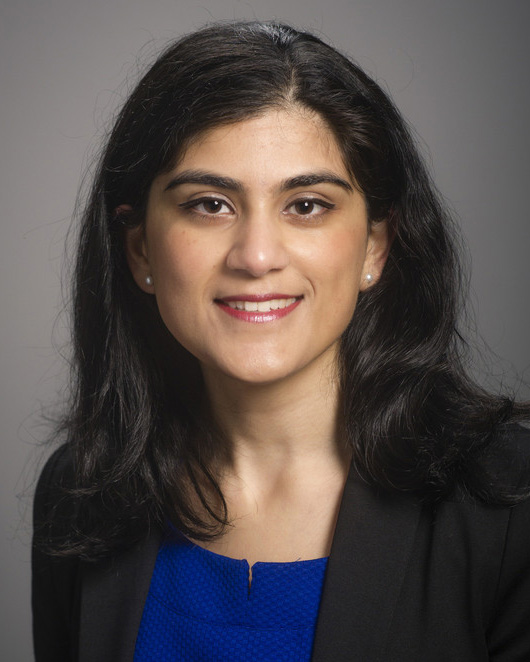Five outstanding educators from the School of Medicine were honored as winners of the 2022 Dean’s Excellence Awards in Teaching, an honor recognizing exceptional contributions by UAB Heersink School of Medicine faculty.
In the final piece of our two-part series highlighting these educators, junior faculty winners Marissa Dean, M.D.; and Sheetal Gandotra, M.D., share their inspirations for teaching, along with tips for faculty looking for new resources in education.
 Marissa Dean, M.D.
Marissa Dean, M.D.
Assistant Professor, Department of Neurology
How did you become interested in teaching?
My interest in teaching was seen by others before I recognized it myself. As a second-year medical student, I had a senior resident tell me that I would be a future resident or fellowship program director. At the time, I was surprised by this comment, as I couldn’t envision myself as someone in a teaching leadership role when I was just learning how to be a doctor. Over time, my passion for teaching became more obvious: I would find myself working extra hours to prepare teaching sessions for the following day, and I would enjoy seeing how this extra time was beneficial for the learners I was teaching. In summary, my passion for teaching seems to be a part of my personality that has grown over time.
What inspires you to teach?
My patients. By inspiring and teaching the next generation of doctors, I hope to help hundreds of patients receive excellent care in the future.
What is your favorite aspect of working with learners and trainees?
It’s so fulfilling to see learners grow, both academically and personally. I have learned so much from learners and trainees. Their eagerness to learn inspires and encourages me to improve and adapt my teaching style.
Do you have a favorite course? Would you share why it’s your favorite?
Not surprisingly, my favorite course is Introduction to Clinical Medicine. {Note: Dean is co-director of the ICM course and co-director of the Clinical Skills Scholars Program}. The art of medicine is so critical in providing excellent care for our patients, and during this two-year course, medical students are introduced to these concepts. Whether or not a physician considers themselves a teacher, they need to be to care for patients. Teaching and communicating needs to be adapted to the needs of each patient encounter, and this is a skill that students begin to learn in ICM.
What resources do you use to keep refining your teaching skills?
I continuously utilize two resources to refine my teaching style: learner feedback and self-reflection. Each trainee learns in a different way, so adapting my teaching style to each learner is an area I continue to refine. By listening to feedback and reflecting on teaching encounters, I hope to continue to improve my teaching style.
What resources would you recommend for faculty who want to learn or develop new skills in teaching?
Again, the two biggest resources that I use to refine my own skills are the same I would recommend for faculty who want to learn or develop new skills in teaching. Learner feedback and self-reflection are readily available to every teacher. I encourage faculty to request feedback from learners, and to reflect on teaching encounters that went well and those that didn’t seem go to as planned. Remaining humble and actively listening to learners continues to help me learn how to be an effective teacher.
Sheetal Gandotra, M.D.
Assistant Professor, Division of Pulmonary, Allergy, and Critical Care Medicine
How did you become interested in teaching?
It’s hard to remember a specific moment that prompted my interest in teaching. As an eldest child, I was always encouraged to teach my brothers, and I remember being asked to be a peer tutor in elementary school, which certainly sparked an interest in education. My interest in teaching continued to grow via many teaching roles during my schooling, and subsequently, my medical career.
What inspires you to teach?
Knowing that I have an opportunity to impart passion for medicine, as well as pulmonary and critical care, while having an impact on the education of our future physicians is very inspiring. I benefited greatly from excellent teachers and mentors, who served as role models and continue to inspire me daily. Teaching is a way to pay forward all of their efforts.
What is your favorite aspect of working with learners and trainees?
I love that I learn so much while working with trainees. They constantly inspire me to be better in all that I do for patient care, as well as in education and advancements to the field of medicine. It’s amazing to see trainees gain an understanding of their knowledge and grow in their own role as a teacher as well. I’m always excited to see all that they will do with their careers.
What resources do you use to keep refining your teaching skills?
I seek out professional development opportunities through Pulmonary and Critical Care Medicine (PCCM) national organizations, including the American Thoracic Society (ATS), American College for Chest Physicians (CHEST) and the Association for Pulmonary Critical Care Medicine Program Directors (APCCMPD). I have an opportunity to think about education as part of my role on the executive committee of the ATS Section of Medical Education. I also learn from colleagues and, of course, feedback from our trainees.
What resources would you recommend for faculty who want to learn or develop new skills in teaching?
It’s very helpful to be a member of an educator community such as a program directors’ association or other national society that focuses on education. Consider dedicating time at national conferences to medical education sessions – you can build connections and learn about innovative teaching from your colleagues. I also enjoy reading about MedEd innovations in ATS Scholar, MedEdPortal or other journals. The Department of Medicine’s own MedEd Moments series is a great place to start!